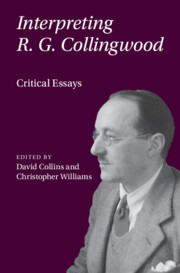Book contents
- Interpreting R. G. Collingwood
- Interpreting R. G. Collingwood
- Copyright page
- Contents
- Figures
- Contributors
- Acknowledgements
- Abbreviations
- Introduction
- Part I Situating Collingwood: Beyond Idealism
- Chapter 1 Collingwood and Logical Positivism
- Chapter 2 On Collingwood’s Criticism of Analytic Philosophy
- Chapter 3 Collingwood and the New Pragmatists on Socially Situated Knowledge
- Chapter 4 Collingwood and Wittgenstein on the Relation between Philosophy and Poetry
- Chapter 5 Collingwood and Phenomenology
- Chapter 6 Revisiting Gadamer’s Critique of Collingwood
- Part II Issues in Collingwood’s Philosophy
- Bibliography
- Index
Chapter 2 - On Collingwood’s Criticism of Analytic Philosophy
from Part I - Situating Collingwood: Beyond Idealism
Published online by Cambridge University Press: 22 November 2024
- Interpreting R. G. Collingwood
- Interpreting R. G. Collingwood
- Copyright page
- Contents
- Figures
- Contributors
- Acknowledgements
- Abbreviations
- Introduction
- Part I Situating Collingwood: Beyond Idealism
- Chapter 1 Collingwood and Logical Positivism
- Chapter 2 On Collingwood’s Criticism of Analytic Philosophy
- Chapter 3 Collingwood and the New Pragmatists on Socially Situated Knowledge
- Chapter 4 Collingwood and Wittgenstein on the Relation between Philosophy and Poetry
- Chapter 5 Collingwood and Phenomenology
- Chapter 6 Revisiting Gadamer’s Critique of Collingwood
- Part II Issues in Collingwood’s Philosophy
- Bibliography
- Index
Summary
Collingwood’s criticism of analytic philosophy is essentially an accusation of ahistoricality and implicit dogmatism. Russell and Moore, who are Collingwood’s primary targets, had a theory of analysis that would clarify sentences by situating them in the context of all possible expressive power. This strategy is what I call single-commitment tracking. Collingwood argues that there is no way of providing a non-dogmatic account of the constitutive features of a single-commitment tracking account. Instead, Collingwood adopts multi-commitment tracking, in which an expressed commitment set has its constitutive features, which Collingwood calls “absolute presuppositions,” made explicit by an expressing commitment set. This achieves the clarity desired by analytic philosophy, but also introduces something which itself is uninterpreted. So, there is no explicatable context of all possible expressive power, and Collingwood has shown that it is only by engaging in this method of explicating absolute presuppositions, which he calls metaphysics, that new expressive power is unlocked.
Keywords
- Type
- Chapter
- Information
- Interpreting R. G. CollingwoodCritical Essays, pp. 26 - 45Publisher: Cambridge University PressPrint publication year: 2024

